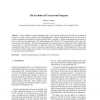602 search results - page 25 / 121 » Unsupervised Problem Decomposition Using Genetic Programming |
120
click to vote
GECCO
2010
Springer
15 years 5 months ago
2010
Springer
Foreign exchange (forex) market trading using evolutionary algorithms is an active and controversial area of research. We investigate the use of a linear genetic programming (LGP)...
117
click to vote
GECCO
2009
Springer
15 years 8 months ago
2009
Springer
Solving complex, real-world problems with genetic programming (GP) can require extensive computing resources. However, the highly parallel nature of GP facilitates using a large n...
246
click to vote
FUIN
2011
14 years 5 months ago
2011
In this article, a novel concept is introduced by using both unsupervised and supervised learning. For unsupervised learning, the problem of fuzzy clustering in microarray data as ...
GECCO
2008
Springer
15 years 3 months ago
2008
Springer
Determining if a group of proteins are functionally associated among themselves is an open problem in molecular biology. Within our long term goal of applying Genetic Programming ...
133
click to vote
APIN
1998
15 years 1 months ago
1998
Process algebra are formal languages used for the rigorous specification and analysis of concurrent systems. By using a process algebra as the target language of a genetic program...

